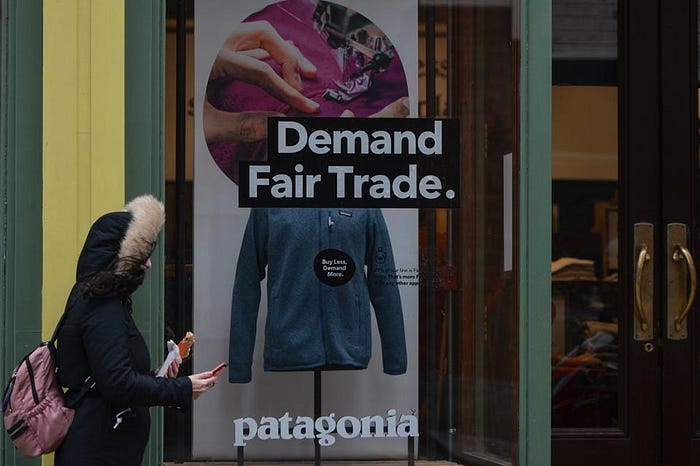Patagonia's Groundbreaking Approach to Human-Centric Business
Written on
Chapter 1: A Unique Business Philosophy
Patagonia, renowned for its outdoor apparel and equipment, has consistently pursued its own unique path. Through initiatives like the "Don't Buy This Jacket" advertisement in the New York Times, and its decision to dedicate Black Friday sales to environmental efforts, Patagonia demonstrates its unwavering commitment to making a positive impact on the planet. Additionally, the company's "Earth tax," which allocates 1% of sales to environmental nonprofits, highlights its mission to enhance global wellbeing.
In a recent move that underscores its commitment to employee welfare, Patagonia announced the temporary closure of all its stores, offices, and warehouses in the U.S. and Canada from December 25 to January 2. The company stated this decision was made "because our people need a break." Although their online store will remain open, customers have been notified of potential shipping delays during this holiday period. It can be inferred that employees will receive paid time off during this closure, emphasizing Patagonia's dedication to its workforce.
Given that typical sporting goods stores see a significant spike in sales during December—approximately 60% more than during an average week—it is unclear how much revenue Patagonia might forgo by closing its doors. Nevertheless, this decision reflects the company's prioritization of employee well-being over profits.
Taking Care of Employees
Patagonia's actions exemplify a broader principle: true care for people translates to better business outcomes. Just as a person's character can be judged by how they treat service staff, companies too should be evaluated on how they treat their employees. By fostering a respectful and supportive workplace, companies can enhance employee satisfaction and loyalty, ultimately benefiting their customers as well.
This approach could be a solution to the employment challenges currently facing the retail sector, which saw 176,000 fewer jobs in November compared to pre-pandemic levels in February 2020. Patagonia's commitment to social responsibility is a refreshing departure from the norm in today's business landscape.
Authenticity in Business
"Brands are having difficulty forming genuine connections with consumers because they lack authenticity themselves," explains Dr. Martina Olbert, founder of Meaning.Global and an expert on brand significance. "Patagonia stands apart; it does not attempt to connect with authenticity—it simply embodies it. Their authenticity is a reflection of their integrity."
While many brands tout purpose-driven mission statements, few genuinely adhere to them. Often, brands are artificial constructs that leverage marketing to manipulate consumer aspirations for profit.
"Brands have inundated consumers with marketing strategies that capitalize on our deepest desires, but this value is often illusory," remarks Dr. Olbert. "True brand power lies in empowering consumers to lead authentic lives."
Patagonia differentiates itself through high-quality products that encourage less consumption. Its commitment to sustainability is evident in its "Ironclad guarantee," which ensures that any defective product will be repaired at a reasonable cost. Additionally, the brand offers a trade-in program for used items, promoting responsible consumption.

Making a Positive Impact
Patagonia's efforts extend beyond mere rhetoric; the company is actively making a difference. Recently, it was awarded the Corporate Excellence Award for Climate Innovation by the U.S. Department of State for its initiatives in Argentina. Alex Perry, Patagonia's director of Latin America, stated, "We have rejected outdated thinking and learned how to build a successful business that contributes positively to the future."
A New Perspective on Consumerism
Dr. Olbert's new study, "Reimagining Consumerism As A Force For Good," challenges brands to rethink their relationships with consumers. She argues that the traditional consumer model is outdated and misaligned with contemporary values.
The current consumer landscape is shifting; excessive marketing aimed at fulfilling material desires is leaving many feeling unfulfilled. "This creates a meaning gap in consumerism, lacking context about how consumption affects our lives," she observes.
Patagonia represents a shift toward a more conscious consumption model. Rather than perpetuating feelings of inadequacy, brands must facilitate genuine self-realization for consumers.
Sustainability Redefined
Many brands use sustainability merely as a marketing tool rather than a genuine commitment. Dr. Olbert asserts that sustainability should be a fundamental aspect of business practices, reflecting moral responsibility.
To Patagonia, sustainability means conducting business with ethical awareness and consideration for all stakeholders—employees, consumers, and the environment alike. The company's commitment to sustainability is evident in its self-imposed "Earth tax" and its comprehensive recycling initiatives.
Patagonia's decision to close its doors during the holiday season for employee well-being is a remarkable departure from the profit-driven norms of retail.
Adapting to Change
The evolving model of humanistic consumerism, as identified by Dr. Olbert, is still in its infancy but has accelerated due to the pandemic's impact on societal values. Patagonia has long integrated this philosophy into its core values since its founding in 1973 by Yves Chouinard.
Brands must recognize the ongoing shift in consumer expectations and adapt accordingly. "If we cling to outdated concepts, we risk repeating the past," warns Dr. Olbert. "Change is inevitable, and we must anticipate it."
The transition from aspirational to humanistic consumerism is underway, where brands help consumers define their own identities rather than impose meanings upon them. Patagonia exemplifies this shift, focusing on enhancing consumer well-being.
As we navigate the new era of conscious consumption, the call for brands to engage in responsible commerce that aligns with evolving human needs and values becomes increasingly urgent.
Chapter 2: Insights from Patagonia's Leadership
In this video, Rose Marcario, President & CEO of Patagonia, discusses the company's mission and how it aligns with its human-centric values.
This video showcases how the billionaire founder of Patagonia has given away the company to combat the climate crisis, reflecting a new model of corporate responsibility.